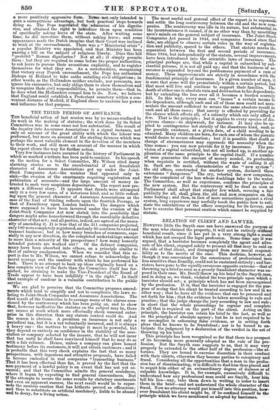RELATION OF CLIENT AND LAW I EX.
llowEvnn little the Smyth ease can have answered the purpose of the man who claimed the property, it will not be entirely without beneficial result, since it has put in a very strong light a moral which has not escaped the legal profession. Some time ago it was argued, that a barrister becomes completely the agent and advo- cate of his client, engaged solely to present all that may be said on the side of that client, and disengaged from any moral responsi- bility as to the merits of the case. This doctrine, however, al- though-it was convenient for the consciences of professional men less sensitive than Romilly, could not be sustained entirely ; and bar- risters have gone to the equallyerroneous opposite extreme—that of throwing up a brief as soon as a grossly fraudulent character was ex- posed in their case. Mr. Bovill threw up his brief in the Smyth case, and in doing so, we think, violated the true principle upon which a barrister should act; a principle which has not been unrecognized by the profession. It is, that the barrister is engaged for the pur- pose of seeing that his client be treated according to law and in no other way ; that he have all the evidence that can be procured and set forth for him ; that the evidence be taken according to rule and practice; that the judge charge the jury according to law and rule ; in short that the whole proceedings be regular and complete in all that is required on the part of the client. Acting on this principle, the barrister can retain his brief to the last, as well as on the principle of absolute agency ; but he is not required to be an accomplice in suborning false evidence, or in setting forth pleas that he knows to be fraudulent ; nor is he bound to an- ticipate the judgment by a declaration of the verdict in the act of throwing up his brief.
This principle has been recognized so far that there is a prospect of its becoming more generally adopted as the rule of the pro- fession. But the Smyth case suggests to us, that it may very properly be extended to the other half of the .profession—the st- -tornies. They are bound to exercise discretion in their conduct with their clients, otherwise they become parties -to conspiracy and fraud. Considering all the opportunities that a man in the profes- sion has of discriminating, it is difficult to find him thus placed and to acquit him either of an extraordinary degree of dulness or of culpable knowledge. It is, for example, excessively difficult to understand how any professional man could see Smyth, hear him -tell his lies—nay, take them down in writing in order to insert them in the brief—and not understand the whole character of the fraud. Now no attorney would put himself into this position, how- ever fraudulent his -client might be, if he confined himself to the principle which we have mentioned as adopted by barristers.


























 Previous page
Previous page